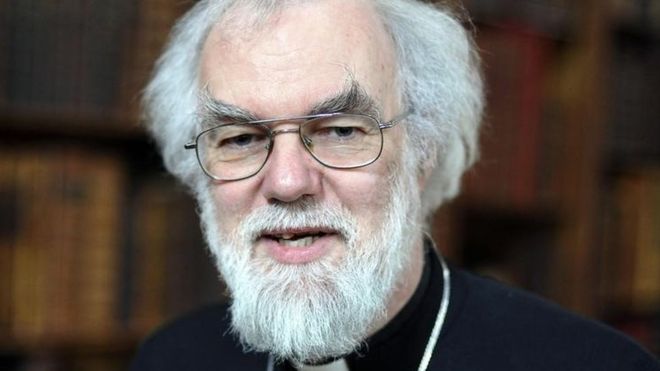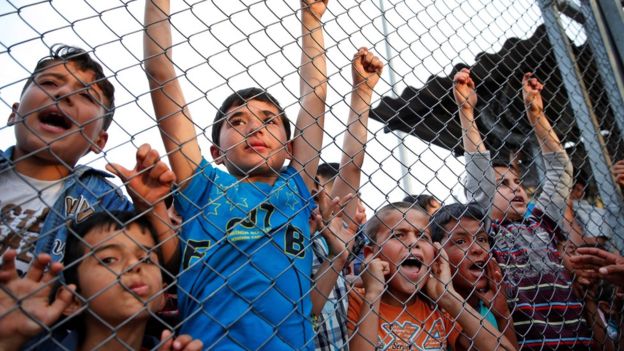The UK government needs to do more to respond to the refugee crisis, the former Archbishop of Canterbury Rowan Williams has said.
Dr Williams, who is now the chairman of the charity Christian Aid, said the rhetoric in the media which suggested the UK was “full” was “unfounded”.
“The UK must not turn a blind eye to this crisis. We must do more,” he said.
The government said it had pledged to resettle 20,000 Syrian refugees by 2020 – and about 1,600 had already arrived.
Dr Williams, who made his comments ahead of Refugee Week which begins on Monday, said the refugee crisis was the biggest displacement of people to Europe since the Second World War.
“Desperate people who have been driven out of their homes by war are being forced to make dangerous journeys in search of sanctuary. Yet many countries are closing their borders and putting up barbed wire,” he said.
“The UK must not turn a blind eye to this crisis. We can and must do more to respond.”
‘Welcoming strangers’
He said the UK had a proud history of offering refuge to those in need, welcoming Jewish children from Nazi Germany, Vietnamese refugees in the 1970s and Kosovan refugees in the late 1990s.
“The rhetoric in the media is one that suggests that the UK is ‘full’, and that those arriving on our shores are a drain on our economy,” he said.
“Not only are these assertions unfounded, but they fail to recognise the positive, life-affirming contributions that generations of refugees have made to British society – and that we ourselves are changed by welcoming the stranger.”
Dr Williams, who was appointed the 104th Archbishop of Canterbury in 2002 and stood down in 2012, said the charity Christian Aid was founded on the belief that “all people would live together as neighbours”.
The charity wants the government to take on “far higher” numbers of refugees and accelerate the resettlement of the 20,000 Syrian refugees it has agreed to accept.
Syria has been embroiled in a bloody armed conflict for nearly five years. More than 250,000 Syrians have been killed, and 11 million displaced from their homes – more than four million have already left the country.
Vulnerable children
A Home Office spokesman said: “Last month the UK announced we will resettle unaccompanied migrant children registered in Greece, Italy or France before 20 March, where this is in their best interests.
“It will mean the UK can focus on the most vulnerable children already in Europe – without encouraging more to make the journey.
“This builds on the further announcement that 3,000 vulnerable children and family members will be resettled direct from the Middle East and North Africa.”
Syrian refugees are arriving in the UK under the government’s Vulnerable Persons Relocation (VPR) scheme.
The Home Office also highlighted the fact that the government had pledged £2.3bn in humanitarian aid to Syria and its neighbouring countries.
- Vulnerable Persons Relocation Scheme
- “Paperwork” is completed before the refugees arrive.
- Prioritises women and children at risk, people in need of medical attention and survivors of torture and violence.
- All refugees settled under the scheme have undergone a two-step security screening process.
- People under the scheme will have access to housing, medical care and education, and they can work.
- The Home Office provides funding of at least £10,000 per refugee for the first year.
- Refugees taken into the UK under the scheme granted five years’ humanitarian protection which includes access to public funds, the labour market and the possibility of family reunion, if a person was separated from their partner or child when leaving their country.
- After those five years they can apply to settle in the UK.
A note on terminology: The BBC uses the term migrant to refer to all people on the move who have yet to complete the legal process of claiming asylum. This group includes people fleeing war-torn countries such as Syria, who are likely to be granted refugee status, as well as people who are seeking jobs and better lives, who governments are likely to rule are economic migrants.
Photo of Dr. Williams copyright Press Association
Syrian refugees at a camp in Turkey photo copyright Associated Press


